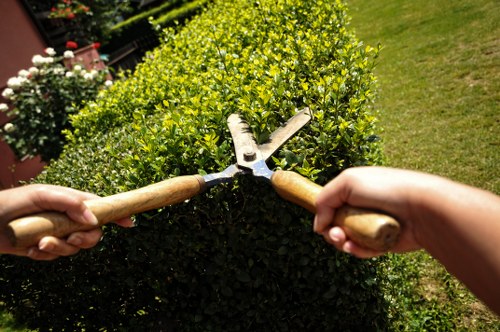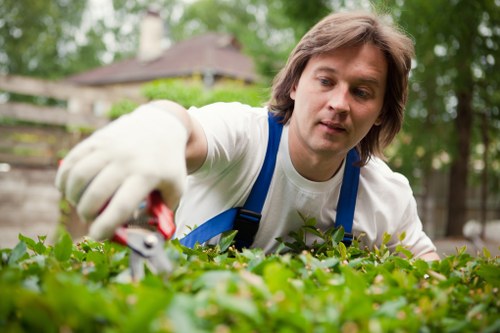Garden Maintenance in Waterloo
Introduction to Garden Maintenance

Maintaining a beautiful garden in Waterloo requires consistent care and attention. Whether you're a seasoned gardener or a novice, understanding the fundamentals of garden maintenance can help ensure your outdoor space remains vibrant and healthy throughout the year.
Waterloo's climate presents unique challenges and opportunities for garden enthusiasts. By tailoring your maintenance practices to the local environment, you can optimize plant growth and resilience.
In this article, we'll explore essential garden maintenance tips, seasonal tasks, and professional services available in Waterloo to keep your garden thriving.
Essential Garden Maintenance Tips

Regular Weeding
Weeds compete with your plants for nutrients, water, and light. Regular weeding prevents unwanted plants from taking over and ensures that your desired plants flourish.
Consider implementing mulch around your plants to suppress weed growth and retain soil moisture. Organic mulches also enrich the soil as they decompose.
Use manual weeding or appropriate tools to remove weeds without disturbing the roots of your healthy plants.
Soil Health and Fertilization

Testing and Amending Soil
Healthy soil is the foundation of a thriving garden. Regularly test your soil to determine its pH level and nutrient content. This information will guide you in making necessary amendments.
Add organic matter, such as compost or aged manure, to improve soil structure, drainage, and fertility. Incorporate balanced fertilizers to provide essential nutrients to your plants.
Rotate crops and plants to prevent soil depletion and reduce the risk of pests and diseases.
Watering and Irrigation

Efficient Watering Practices
Proper watering is crucial for plant health. Water your garden early in the morning or late in the evening to minimize evaporation and ensure that moisture reaches the roots effectively.
Use drip irrigation systems or soaker hoses to deliver water directly to the base of plants, reducing water waste and preventing fungal diseases caused by wet foliage.
Monitor soil moisture levels regularly and adjust your watering schedule based on weather conditions and plant needs.
Pruning and Plant Care

Regular Pruning
Pruning helps maintain the shape and health of your plants. Remove dead or diseased branches to prevent the spread of pests and diseases. Prune flowering plants to encourage more blooms and promote vigorous growth.
Use sharp, clean tools to make precise cuts, and follow proper pruning techniques to avoid damaging your plants.
Different plants have specific pruning requirements, so familiarize yourself with the needs of each species in your garden.
Pest and Disease Management
Integrated Pest Management (IPM)
Effective pest and disease control involves a combination of preventive measures and targeted treatments. Start by choosing disease-resistant plant varieties and maintaining good garden hygiene.
- Introduce beneficial insects, such as ladybugs and lacewings, to naturally control pest populations.
- Use organic pesticides and fungicides as needed, following label instructions carefully.
- Remove and dispose of affected plant parts to prevent the spread of diseases.
Seasonal Garden Tasks
Spring Maintenance
As the weather warms, prepare your garden for the growing season by clearing debris, fertilizing soil, and planting new seeds or seedlings.
Check for overwintered pests and take necessary actions to control them before they become a problem.
Prune shrubs and trees to encourage healthy new growth.
Summer Garden Care

Managing Heat and Drought
Summer heat can stress your plants. Implement shade cloths or plant heat-tolerant species to mitigate the effects of high temperatures.
Ensure consistent watering, especially for container plants, which can dry out quickly.
Mulch helps retain soil moisture and keeps roots cool during scorching months.
Autumn and Winter Preparation

Preparing for Cooler Months
As temperatures drop, protect your garden by covering sensitive plants and adding extra mulch to insulate the soil.
Clean up fallen leaves and debris to reduce the risk of disease and pest infestations during the winter.
Plan and plant cover crops to enrich the soil for the next growing season.
Choosing Professional Garden Maintenance Services

Benefits of Hiring Experts
Professional garden maintenance services in Waterloo offer expertise and convenience. Experienced gardeners understand the local climate, soil conditions, and plant varieties, ensuring optimal care for your garden.
Services typically include regular mowing, pruning, fertilization, pest control, and seasonal clean-ups, freeing up your time to enjoy your outdoor space.
Investing in professional maintenance can enhance the beauty and health of your garden, increasing your property’s value and your personal satisfaction.
DIY Garden Maintenance Tips
Save Money with Home Care
While professional services are beneficial, many garden maintenance tasks can be handled independently. Simple practices, such as regular weeding, watering, and pruning, can significantly impact your garden's appearance and health.
- Use homemade compost to enrich your soil and reduce waste.
- Create your own natural pesticides using household ingredients.
- Implement efficient watering systems to conserve water and ensure even distribution.
Conclusion
Maintaining a Beautiful Waterloo Garden
Garden maintenance in Waterloo involves a blend of knowledge, effort, and the right resources. By following the tips outlined above and considering professional services when needed, you can achieve a lush, vibrant garden that enhances your outdoor living experience.
Remember, a well-maintained garden not only provides aesthetic pleasure but also contributes to a healthier environment.
Start your garden maintenance journey today and enjoy the lasting rewards of your efforts.
Contact us today to schedule your garden maintenance service and transform your Waterloo garden into a thriving paradise.